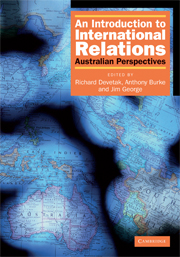Book contents
- Frontmatter
- Contents
- List of tables, figures and boxes
- List of contributors
- Preface and acknowledgments
- An introduction to international relations: the origins and changing agendas of a discipline
- 1 Theory and practice in Australian international relations: the search for identity and security
- Part 1 Theories of international relations
- Part 2 The traditional agenda: states, war and law
- Part 3 The new agenda: globalisation and global governance
- 20 Multilateral economic institutions
- 21 Global trade
- 22 Global finance
- 23 Non-state actors: multinational corporations and international non-governmental organisations
- 24 Global poverty and inequality
- 25 Globalisation and its critics
- 26 The globalisation of Islam
- 27 Global terrorism
- 28 Humanitarianism and armed intervention
- 29 Human rights
- 30 Migration and refugees
- 31 Global environmental politics
- 32 Global governance and the United Nations
- Glossary of terms
- Bibliography
- Index
- References
20 - Multilateral economic institutions
from Part 3 - The new agenda: globalisation and global governance
- Frontmatter
- Contents
- List of tables, figures and boxes
- List of contributors
- Preface and acknowledgments
- An introduction to international relations: the origins and changing agendas of a discipline
- 1 Theory and practice in Australian international relations: the search for identity and security
- Part 1 Theories of international relations
- Part 2 The traditional agenda: states, war and law
- Part 3 The new agenda: globalisation and global governance
- 20 Multilateral economic institutions
- 21 Global trade
- 22 Global finance
- 23 Non-state actors: multinational corporations and international non-governmental organisations
- 24 Global poverty and inequality
- 25 Globalisation and its critics
- 26 The globalisation of Islam
- 27 Global terrorism
- 28 Humanitarianism and armed intervention
- 29 Human rights
- 30 Migration and refugees
- 31 Global environmental politics
- 32 Global governance and the United Nations
- Glossary of terms
- Bibliography
- Index
- References
Summary
Introduction
This chapter will explore the role of three multilateral economic institutions (MEIs) in contemporary economic governance: the International Monetary Fund (IMF), the World Bank, and the World Trade Organization (WTO). As we will see there is no single vantage point from which to view these institutions or from which to assess their importance. The first part of the chapter discusses global governance and globalisation and examines some perspectives on international organisations. Controversies over the role of the MEIs in the global economy have focused on the economic impact of their activities and their representative nature as institutions of governance. The second part of the chapter therefore explores the historical evolution of the IMF, World Bank and WTO as they adapted to the challenges of an evolving global economy. This section examines competing claims concerning their competence as economic managers. Recently, the legitimacy, accountability and representative nature of MEIs have been called into question. The third part of the chapter focuses on the debate over the democratic credentials of the multilateral economic institutions.
In November 1999 some 50,000 protesters disrupted the Third Ministerial Meeting of the WTO. Less than six months later mass protesters also greeted the delegates arriving for the annual meetings of the World Bank and IMF in April 2000 in Washington, DC. Reported extensively by the global media, the actions of the protesters subjected the activities of these three MEIs to intense public scrutiny.
- Type
- Chapter
- Information
- An Introduction to International RelationsAustralian Perspectives, pp. 237 - 247Publisher: Cambridge University PressPrint publication year: 2007



